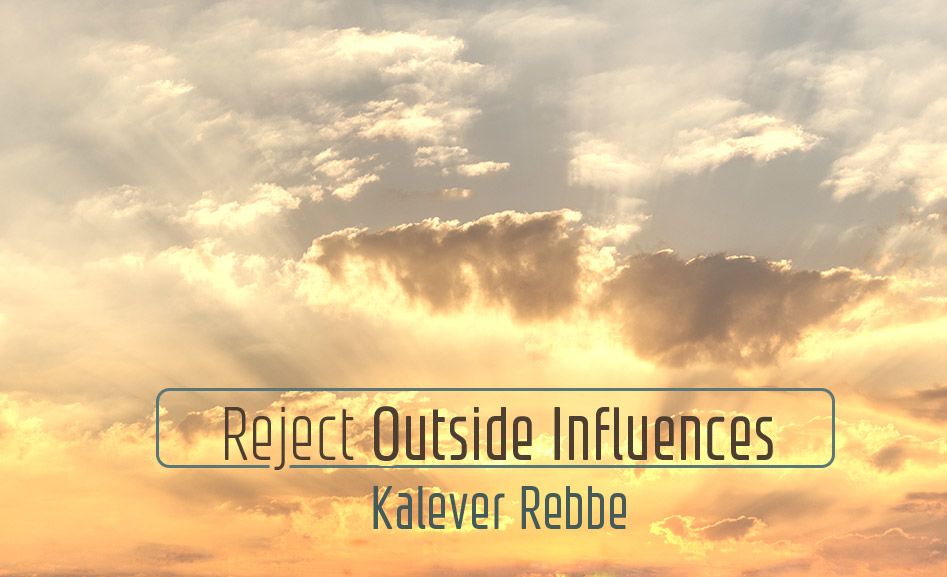
The Konigsberg Letter
In his famous letter, the Gaon of Vilna says: "Every moment a person curbs his tongue, he merits such Divine illumination that no angel can imagine."

In a famous letter known as "The Konigsberg Letter", the Gaon of Vilna wrote to his wife: "Don't go to the synagogue, and it's better that you don't pray at all rather than go to the synagogue and say or hear one forbidden thing."
Look what the Gaon of Vilna, one of the greatest luminaries of Jewish history, is teaching us here. He is telling his righteous wife not to go to synagogue, to stay home and pray at home if there is the slightest chance that she might hear evil speech! This leaves us stunned in realizing the extent that the righteous feared sinning in the area of speech.
The Gaon of Vilna was leaving instructions to his family before he departed for an ultimately abortive journey to the Land of Israel. in that famous letter he wrote on the way from Konigsberg, Germany: "Everything will stand trial; not even a single syllable will remain unexamined. I therefore caution you to accustom yourself to being alone, for the sin of the tongue is worse than anything, as our sages taught: 'These are the things, etc., and evil speech is as weighty as them all.' It is needless for me to elaborate further, how this terrible transgression is the worst of all sins. A person's entire fate depends on his mouth. Our sages said that a person should act in this world as if he is deaf and dumb, and lock his lips together. All the more so, should he guard himself from transgressing in evil speech, foolishness, vows, quarrels and curses, especially in the synagogue and especially on Shabbat and Yomtov, for these  transgressions cast a person to the deepest depths. One cannot imagine the suffering and tribulation for one forbidden utterance, and there's not a single word that isn't transcribed…
transgressions cast a person to the deepest depths. One cannot imagine the suffering and tribulation for one forbidden utterance, and there's not a single word that isn't transcribed…
"For speech and character must be properly patterned and all the beginnings are difficult, but afterwards, it will be good for the person.
“The transgressor knows that his ways are bad and that his path is bitter, but he has difficulty in giving up his bad habits. This is every person. Therefore, a person must suffer until the day he dies, not with fasting and self-flagellation, but by harnessing his mouth and his bodily urges, for this is penitence. This bears fruit in the world to come, for 'the candle of a mitzvah is the light of Torah' but the 'way of life is the admonition of ethics'. This is greater than all the fasts and self-flagellations in the world and every moment a person curbs his tongue, he merits such Divine illumination that no angel or any other creation can imagine."
The Gaon of Vilna says here phenomenal praises about the virtue of silence and holy speech, for these are the main rectifications of the soul. Speech directly influences the soul; the soul and emuna are one aspect and closely intertwined. Therefore, one's emuna and spiritual health depend on wholesome speech. Indeed, disturbances of the soul and emotional ills stem from blemished speech.
Conversely, positive and wholesome speech is conducive to spiritual and emotional health, emuna and joy, which in themselves are rectifications of the soul. Positive speech empowers the soul. A person who speaks highly of others, blesses them, encourages them and respects them gets every benefit in return and merits an abundance of blessings in his or her own life. The healthy soul simply merits a greater measure of Divine illumination.
The Gaon of Vilna elaborates on Psalm 34:13-14, "Who is the person that desires life, loves days of seeing good? Guard your tongue from evil and your lips from speaking deceit." He says that by guarding one's tongue, one atones for any sin and is rescued from purgatory. King Solomon says this explicitly (Proverbs 21:23): "He who guards his mouth and his tongue guards from troubles of the soul." Also, "Life and death in the hand of the tongue" (Ibid, 18:21).
A person can destroy a life – especially his own – with one unfortunate utterance. Most importantly, one should refrain from speaking about anyone, particularly if anything he says is derogatory. The Gaon of Vilna even warns about speaking in praise of other people, for someone might argue and begin to speak otherwise. It goes without saying that any negative speech is utterly forbidden.
Enough said. The Gaon of Vilna, one of our greatest scholars ever, who was privy to the innermost secrets of Torah, understood that wholesome speech was the highest priority. Before leaving home on a journey, he commanded his family to exercise special caution in the area of wholesome speech. Who can remain apathetic? From now on, we must try our hardest to guard our tongues with all our might.












Tell us what you think!
Thank you for your comment!
It will be published after approval by the Editor.